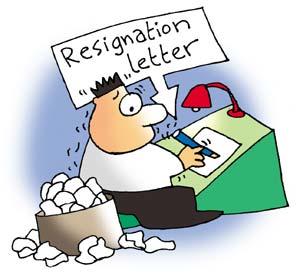 | « Back to article | Print this article |
I quit! 11 smart tips to resign gracefully
Quitting your current organisation is just as difficult as finding a new one. How does one convey the news without burning the bridges?
There are various reasons why people choose to quit their jobs -- a burnout, emergencies, family commitments and sometimes even prospects of new jobs.
Whatever the reason, quitting is a big decision that should be taken after much thought.
If you've finally decided you want to quit, the bigger question is, how do you do it?
1. Resign gracefully
Keep your frustration in check.
You might hate your job and your boss, but you need to keep in mind that you need to quit graciously.
You might have had many problems during the tenure, but you cannot rant it all in front of the boss just because you think you won't see him/her any more.
Do not create unnecessary feuds as it may backfire against you when your future employer does a background check.
Courtesy:YouthIncMag.com

Please click NEXT to continue reading...
Illustration: Uttam Ghosh/Rediff.com
2. Give a notice
Before taking up the job, you received a letter, a phone call or an e-mail confirming your joining date.
Likewise, it is important that you give a notice to your organisation about when you plan to leave.
It is essential to mention the date you wish to quit.
Generally, a two-week prior notice is given, but in cases of contracts you might have signed, you need to abide by the codes of resignation.
This basically offers your employers time to mull over your move and begin work on the technicalities.
Please click NEXT to continue reading...
Illustration: Dominic Xavier/Rediff.com
3. Mention your reasons
Informing about your wish to leave is generally done in person.
It is essential that you tell your boss in person about your resignation first as it shows courtesy and reflects well on formal work mannerisms.
Stick to the facts and talk positively.
Please click NEXT to continue reading...
Illustration: Dominic Xavier/Rediff.com
4. Resignation letter
Back up your talk with your boss with a formal resignation letter.
You never know when you might need that old employer to give you a reference, so it makes sense to take the time to write a polished and professional resignation letter.
It's a statement in writing that you would like to quit, which is important for records and documentation.
Please click NEXT to continue reading...
Illustration: Uttam Ghosh/Rediff.com
4. Request for a recommendation letter
Employers generally prefer recommended employees.
If you are going to spoil your relations with your boss, chances are that you might not get a recommendation letter from him/her.
Before you leave, ask for a letter of recommendation.
As time passes and people move on, it's easy to lose track of previous employers.
With a letter in hand, you'll have written proof of your credentials to give to prospective employers.
Please click NEXT to continue reading...
Illustration: Dominic Xavier/Rediff.com
5. Be thankful
Thank the company and the boss for giving you an opportunity to grow and explore.
It is important for you to tell them that they have helped you learn.
Give them some credit if they have trained you to do your work.
They might have taught you new skills, so specify that.
You may even write a Thank You e-mail to your colleagues if possible.
Please click NEXT to continue reading...
Illustration: Uttam Ghosh/Rediff.com
6. Don't forget the details
Find out about the employee benefits and salary you are entitled to receive upon leaving.
Make inquires about collecting reimbursements.
Ask about the employee provident funds and also collect your personal documents that the office might have kept for the record.
Please click NEXT to continue reading...
Illustration: Dominic Xavier/Rediff.com
7. Return company property
Now that you have served your term it is best now to return any company property that you might possess like keys, documents, laptops, phones etc.
It is not right to have the company chase you to get them back, and you don't want to be held responsible if they are not returned on time.
Make sure you don't take any official company documents on purpose or by error; it could be breach of privacy.
Please click NEXT to continue reading...
Illustration: Uttam Ghosh/Rediff.com
8. Staying longer: Should you or should you not
While your employer might compel you to advance your notice period, you are not obliged to abide.
In any case if your employer insists, consider it.
Otherwise, it is best to politely decline mentioning a reason.
In many cases, employers offer a counter offer when someone valuable decides to quit.
Consider it only if it is much more generous than your new offer.
The sad fact remains that most people regret that they ever took a counter offer and wind up back at square one a year later, with a resignation letter in hand.
Please click NEXT to continue reading...
Illustration: Uttam Ghosh/Rediff.com
9. Help with the transition
In case you are unable to meet your notice period, be of help by training your replacement and be available for exit questioning.
You must be ready to work after-hours if the need arises.
It is also wise to be available on phone or e-mail in case you cannot be physically present when the new employee takes over.
Please click NEXT to continue reading...
Illustration: Uttam Ghosh/Rediff.com
10. Take your belongings along
Whether the objects hold sentimental significance or can be used against you, you never want to leave a personal reminder of your presence with anyone in the company once you have left.
In the same vein, do not leave your workstation cluttered.
It is not only unfair and disrespectful, but also it leaves a sour taste in the mouth of management.
The point is to depart on a high note.
You want everyone to miss you and regret that you quit, not curse you behind your back because your former workspace is now a biohazard.
Please click NEXT to continue reading...
Illustration: Uttam Ghosh/Rediff.com
11. Zip it up!
Last but not least, it is crucial to keep your mouth shut about your former employer once you quit.
The world is small and gossip travels fast; so don't spread confidential or negative information about your old place of employment.
Loose lips do sink ships in the business world, so be professional.
Let others talk while you relax, observe and just do your job.
Illustration: Uttam Ghosh/Rediff.com











